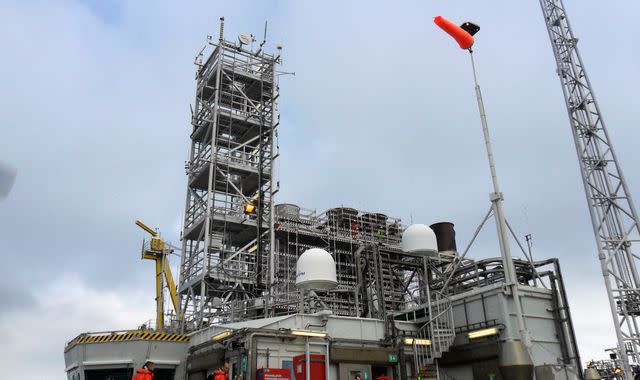Windfall tax to be scrapped if prices drop

The government will end the windfall tax on bumper oil and gas profits in 2028, if prices drop.
The move is in response to fossil fuel companies warning they are cutting back on investment.
The windfall tax - 75% of North Sea oil and gas production profits - will continue for the next five years but the government has announced that if prices fall to historically normal levels for six months the tax rate for oil and gas companies will return to 40%.
Prices had reached historic highs following the invasion of Ukraine, resulting in record profits for oil and gas producers such as Shell and BP.
Companies do not pay the full 75% or 40% rate as they can offset tax liabilities on investment they make.
Though the windfall tax included an investment allowance the government said if it didn't end when prices come down the long-term future of the UK's domestic oil and gas supply is at risk, as the country would import more from abroad.
The windfall tax, known as the energy profits levy, has raised around £2.8bn to date, the government added, and is expected to raise almost £26bn by March 2028.
Funds raised have been used to support household energy schemes such as the energy price guarantee, which limits typical domestic energy bills until the end of June.
Read more
Windfall tax has 'all but wiped out our profit for the year'
Former Shell chief executive takes home nearly £10m for 2022
No new oil and gas projects can be developed if the world is to stay within safe levels of climate change, the International Energy Agency said more than two years ago.
But the Treasury said it would be "irresponsible to turn off the North Sea taps overnight".
"Without oil and gas from British waters, we would be forced to import even more from overseas, putting our security of supply at risk," Gareth Davies, exchequer secretary to the Treasury, said.
Click to subscribe to The Ian King Business Podcast wherever you get your podcasts
The tax will end when prices fall to $71.40 per barrel of oil and 54p per therm of gas for six months. At present a barrel of Brent crude oil is trading around $75 a therm of gas is roughly 60p.
Supporting new oil and gas projects in the North Sea has been politically contentious in recent weeks. Labour has come under pressure from the GMB union and the prime minister over its policy to ban new fossil fuel projects in the waters off the UK.
Labour leader Keir Starmer said he would work with unions to "seize the opportunities" of green energy to prevent mass job losses and avoid mistakes of the 1980s which decimated coal communities.
Today's announcement has been welcomed by industry and some politicians, but not campaigners.
Offshore Energies UK, formerly Oil and Gas UK, but the group said more needed to be done and details of the government plan need to be understood.
"Enabling continued UK energy production now and in future depends on a predictable and fair fiscal environment. The UK must be competitive if we are to be successful in the global race for energy investment," a spokesperson said.
"We provide over 200,000 good, skilled jobs across the length and breadth of the UK."
Labour cautiously welcomed the policy end but said there were problems with loopholes in the how the tax currently operates with much of the money not being collected.
It's "right there is a strategy for bringing those taxes to an end when the time is right, because it should only be on the basis of un-forecast profits", said Labour's shadow immigration minister Stephen Kinnock.
NGO Global Witness said the policy announcement was obscene. It shows government "has learned nothing from the energy crisis and is intent on returning to business as usual as quickly as possible".
"That means doing nothing to reduce our dependence on oil and gas, doing nothing to provide price security for consumers, and doing nothing to rein in climate breakdown. The fossil fuel industry has used its enormous influence and power to fight the windfall tax, and it is an affront to humanity that it appears to have won," a spokesperson said.
Liberal Democrat leader Ed Davey said: "The families and businesses still suffering so much from high energy bills will not forget the failure of the Conservatives to tax the windfall profits of the oil and gas companies properly."

 Yahoo News
Yahoo News 
